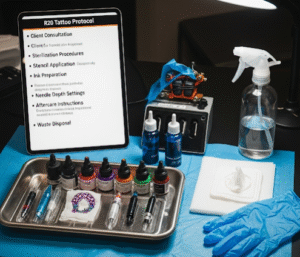Overview
Urinary Tract Infections (UTIs) are common in children and occur when bacteria enter and multiply in the urinary system, which includes the kidneys, ureters, bladder, and urethra. While treatable, UTIs in kids can lead to serious complications like kidney damage if not promptly diagnosed and managed. Early recognition and treatment are key to preventing long-term problems.
What is Urinary Tract Infection (UTI) in Kids
Urinary Tract Infection (UTI) in Kids refers to a bacterial infection that affects any part of a child’s urinary system, most often the bladder (cystitis) or kidneys (pyelonephritis). UTIs can occur at any age, including infancy, and may present with non-specific symptoms in younger children. Because children are more vulnerable to complications like kidney scarring, timely diagnosis and treatment are essential.
Symptoms
In infants and young children:
- Fever without an obvious source
- Irritability or fussiness
- Vomiting or diarrhea
- Poor feeding
- Strong-smelling urine
- Cloudy or bloody urine
- Failure to thrive or weight loss
In older children:
- Pain or burning during urination
- Frequent urination
- Urgency to urinate
- Bedwetting or daytime accidents
- Lower abdominal or back pain
- Fever and chills (may indicate kidney infection)
Causes
UTIs are caused by bacteria entering the urinary tract, most commonly:
- Escherichia coli (E. coli) from the digestive tract
- Poor hygiene (especially in girls, due to shorter urethra)
- Holding urine too long, leading to bacterial overgrowth
- Constipation, which can affect bladder emptying
- Structural abnormalities of the urinary tract
- Vesicoureteral reflux (VUR) – backward flow of urine from bladder to kidneys
Risk Factors
- Girls (due to shorter urethra and closer proximity to the anus)
- Uncircumcised boys under 1 year of age
- Poor toilet hygiene practices
- Structural abnormalities of the urinary tract
- Family history of UTIs or kidney problems
- Constipation
- Neurological disorders affecting bladder function
- Previous UTI
Complications
If untreated or recurrent, pediatric UTIs can cause:
- Kidney infections (pyelonephritis)
- Kidney scarring or damage
- High blood pressure (secondary to kidney damage)
- Sepsis (rare but serious spread of infection)
- Failure to thrive
- Vesicoureteral reflux (VUR) and chronic kidney problems
Prevention
- Encourage regular urination; avoid holding in urine
- Proper wiping technique: front to back for girls
- Adequate hydration
- Prompt treatment of constipation
- Teach proper toilet hygiene
- Avoid bubble baths and harsh soaps in the genital area
- Routine bathroom breaks for school-aged kids
- Monitor for signs of infection after a prior UTI
Treatment Options in Korea
South Korea offers expert pediatric urology and nephrology care with access to advanced diagnostics and safe, effective treatment plans:
- Diagnosis:
- Urine analysis and culture to identify infection and specific bacteria
- Ultrasound of the kidneys and bladder to check for structural issues
- Voiding cystourethrogram (VCUG) for recurrent UTIs to detect VUR
- DMSA renal scan for kidney involvement or scarring
- Treatment:
- Antibiotics: oral or intravenous depending on severity and age
- Hospitalization: may be needed for infants or severe kidney infections
- Pain relievers and antipyretics for fever and discomfort
- Hydration and close monitoring
- Prophylactic antibiotics in cases of recurrent UTIs or VUR
- Surgical intervention:
- Recommended in children with anatomic abnormalities or severe VUR
- Performed using minimally invasive pediatric urological techniques
Korea’s hospitals offer family-centered care, ensuring accurate diagnosis, appropriate treatment, and long-term monitoring for children with UTIs.













